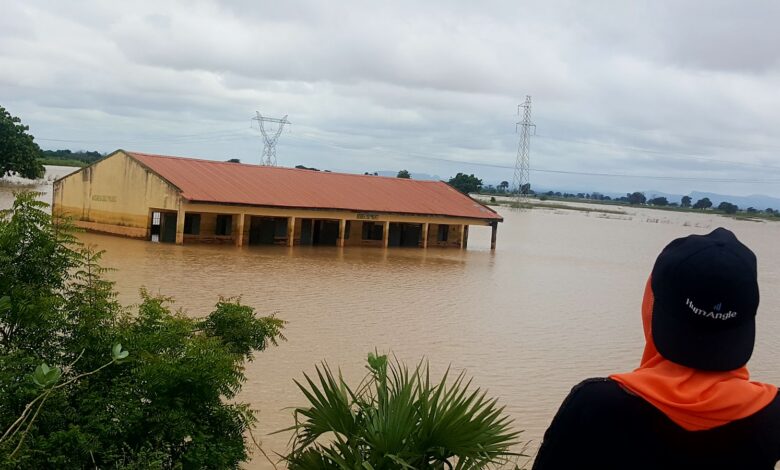Excess Water From Dams Increases Severity Of Floods In Adamawa
The opening of Kiri and Lagdo dams spillways exacerbated the effects of flooding in Adamawa, northeast Nigeria.

“Our children no longer go to school because either the school has been submerged by the flood or it is a camp for displaced persons,” says Denis Sarka, a victim of the recent flooding that has caused widespread destruction and displacements in Nigeria’s northeastern state of Adamawa.
Sarka who lives in Numan, one of the affected Local Governments, has faced flood risks before due to the proximity to the banks of the Benue River.
But this year, torrential rainfall and the overflowing of the Kiri dam in the state and Lagdo dam in neighbouring Cameroon have devastated communities.
According to a briefing from the head of the Adamawa State Emergency Management Agency (SEMA), Mohammed Aminu, 27,800 households and 89,342 hectares of farmlands were destroyed by the flood. He was also quoted to have disclosed that 172,000 farmers in 11 local governments were affected.
“It was as a result of heavy rainfall that the dams were released since they could no longer accommodate the volume of water,” said Praise B Mahdakula, one of the team coordinators for the local emergency management committee.
“I sympathise with the victims because the amount of loss is unimaginable. Almost all the ten wards in Numan local government were flooded,” she added.
The information officer in Numan, Kelet Samson, says the flood has caused a lot of destruction, “if one is to estimate the amount of loss, it could go beyond 100 million.”
According to Kalet, who doubles as a member of the local emergency management committee, “so far, no assistance has come for the displaced through the committee, and at the moment, these people need food and clothing like cold wear for protection against the cold with their children.”

Many have lost their homes and livelihoods.
“I have lost all that I ever worked for—my business, farm, house and everything. We have not received any relief material in this camp at Hayingada, or maybe it has not reached us yet,” cries Usman Ibrahim, a farmer and businessman in Numan.
“Some of the people affected by the flood did not heed the advisory to relocate. There seems to be some settlement attachment amongst dwellers as they refuse to migrate even after they were warned of the dangers and possibility of flood occurrence before now claiming it’s the land of their ancestors. They can’t leave,” says the secretary of the local emergency committee Numan LG, Francisca Ensily.
Denis, a displaced person in one of the camps, says, “Even after being warned and being victims, we can’t leave this place because we inherited it from our forefathers. It holds great memories of them. Leaving this place is like an abomination.

In Madagali Local Government Area, the affected residents had to flee after the flood submerged their houses in August.
“The place for safety is the primary school in Shuwa because it is an upland area and is now partitioned for households and individuals to stay,” says Ibrahim Ahmed Medugu, the head of a temporary camp in Shuwa, one of the affected towns in Madagali.
He also says that while some people have sought refuge in the school, others have travelled to stay with their relatives in safer localities. Ibrahim further laments that victims need support; even though the State Emergency Management Agency had provided some relief materials but that is not enough.
John Sinamai, a resident of Pallam community, lost his house.
“It was at midnight when we were sleeping with my family, and my neighbour called me through the telephone to inform me that flood had invaded our community.”.
He recalls waking up his family and moving to safer grounds. “I had to wake my wife and children up to immediately move out of the house to the safer area that is Lumadu primary school in Shuwa without taking any single valuable item.”

A resident of Mayo-Wandu, 66, Dali Udurbu, describes the flooding as unprecedented. “I can only compare this loss to that of Boko Haram when they invaded our community in 2014. What pained me most is my certificate documents and those of my children that have been washed away by the flood.”
The bridge connecting Madagali and Michika Local Government Areas of Adamawa State to the rest of the States was swept away by the flood. It was previously destroyed by Boko Haram when the group invaded Madagali 2014.
Praise also commented on preventing the occurrence of flood disasters. She spoke on the need for awareness before opening of dams spillways, provision of more drainages and desilting the river to increase water flow.
This report was produced under the HumAngle Accountability Fellowship with support from the MacArthur Foundation.
Support Our Journalism
There are millions of ordinary people affected by conflict in Africa whose stories are missing in the mainstream media. HumAngle is determined to tell those challenging and under-reported stories, hoping that the people impacted by these conflicts will find the safety and security they deserve.
To ensure that we continue to provide public service coverage, we have a small favour to ask you. We want you to be part of our journalistic endeavour by contributing a token to us.
Your donation will further promote a robust, free, and independent media.
Donate HereStay Closer To The Stories That Matter




